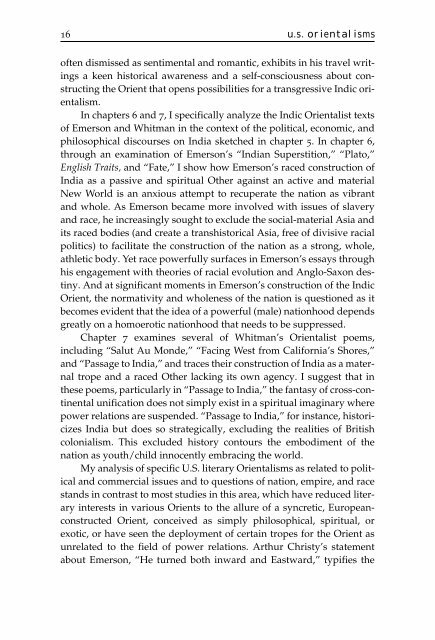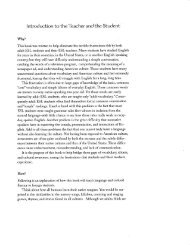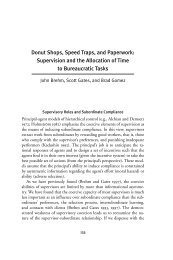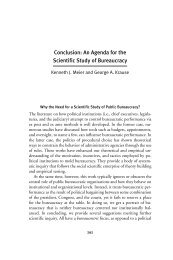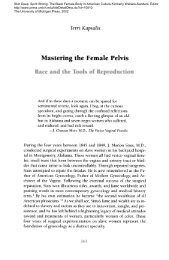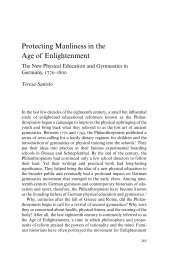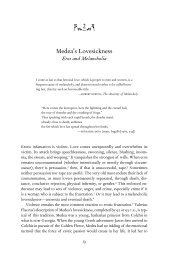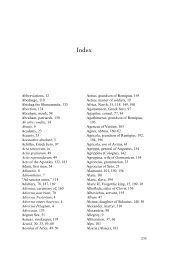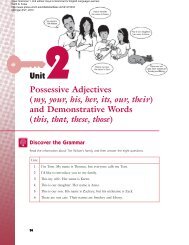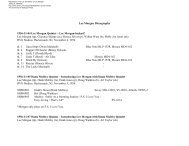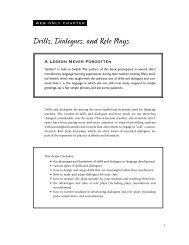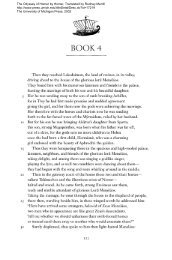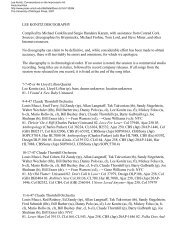Introduction - The University of Michigan Press
Introduction - The University of Michigan Press
Introduction - The University of Michigan Press
Create successful ePaper yourself
Turn your PDF publications into a flip-book with our unique Google optimized e-Paper software.
16 u.s. orientalisms<br />
<strong>of</strong>ten dismissed as sentimental and romantic, exhibits in his travel writings<br />
a keen historical awareness and a self-consciousness about constructing<br />
the Orient that opens possibilities for a transgressive Indic orientalism.<br />
In chapters 6 and 7, I specifically analyze the Indic Orientalist texts<br />
<strong>of</strong> Emerson and Whitman in the context <strong>of</strong> the political, economic, and<br />
philosophical discourses on India sketched in chapter 5. In chapter 6,<br />
through an examination <strong>of</strong> Emerson’s “Indian Superstition,” “Plato,”<br />
English Traits, and “Fate,” I show how Emerson’s raced construction <strong>of</strong><br />
India as a passive and spiritual Other against an active and material<br />
New World is an anxious attempt to recuperate the nation as vibrant<br />
and whole. As Emerson became more involved with issues <strong>of</strong> slavery<br />
and race, he increasingly sought to exclude the social-material Asia and<br />
its raced bodies (and create a transhistorical Asia, free <strong>of</strong> divisive racial<br />
politics) to facilitate the construction <strong>of</strong> the nation as a strong, whole,<br />
athletic body. Yet race powerfully surfaces in Emerson’s essays through<br />
his engagement with theories <strong>of</strong> racial evolution and Anglo-Saxon destiny.<br />
And at significant moments in Emerson’s construction <strong>of</strong> the Indic<br />
Orient, the normativity and wholeness <strong>of</strong> the nation is questioned as it<br />
becomes evident that the idea <strong>of</strong> a powerful (male) nationhood depends<br />
greatly on a homoerotic nationhood that needs to be suppressed.<br />
Chapter 7 examines several <strong>of</strong> Whitman’s Orientalist poems,<br />
including “Salut Au Monde,” “Facing West from California’s Shores,”<br />
and “Passage to India,” and traces their construction <strong>of</strong> India as a maternal<br />
trope and a raced Other lacking its own agency. I suggest that in<br />
these poems, particularly in “Passage to India,” the fantasy <strong>of</strong> cross-continental<br />
unification does not simply exist in a spiritual imaginary where<br />
power relations are suspended. “Passage to India,” for instance, historicizes<br />
India but does so strategically, excluding the realities <strong>of</strong> British<br />
colonialism. This excluded history contours the embodiment <strong>of</strong> the<br />
nation as youth/child innocently embracing the world.<br />
My analysis <strong>of</strong> specific U.S. literary Orientalisms as related to political<br />
and commercial issues and to questions <strong>of</strong> nation, empire, and race<br />
stands in contrast to most studies in this area, which have reduced literary<br />
interests in various Orients to the allure <strong>of</strong> a syncretic, Europeanconstructed<br />
Orient, conceived as simply philosophical, spiritual, or<br />
exotic, or have seen the deployment <strong>of</strong> certain tropes for the Orient as<br />
unrelated to the field <strong>of</strong> power relations. Arthur Christy’s statement<br />
about Emerson, “He turned both inward and Eastward,” typifies the


